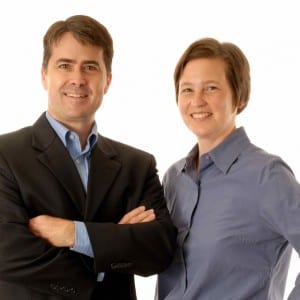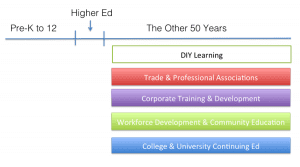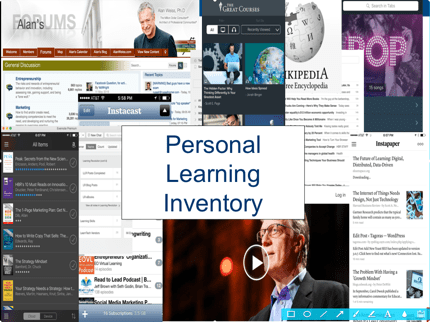
The learning landscape is constantly evolving and thanks to technology, it has changed dramatically in recent years. Those of us in in the association world, especially in leadership positions, need to be paying attention to these changes so that we can better meet the needs of learners and capitalize on the opportunities that now exist.
In this episode of the Leading Learning Podcast, Jeff and Celisa discuss two shifts and a gap that are driving the market for lifelong learning. They talk about the fragmented market that exists in “the other 50 years” once people begin their career, the power that subject matter experts and learners now have, and why associations need to assert more leadership in order to fill the gap that these shifts have created.
To tune in, just click below. To make sure you catch all of the future episodes, be sure to subscribe by RSS or on iTunes. And, if you like the podcast, be sure to give it a tweet!
Listen to the Show
Read the Show Notes
[00:20] – A reminder to check out the Leading Learning Symposium, an event designed specifically for senior leaders at organizations in the business of lifelong learning, continuing education, and professional development. The symposium takes place this year on October 24-25 in Baltimore, Maryland.
[01:08] – Thank you to Web Courseworks, makers of the CourseStage learning management system, for being a sponsor of this episode of the Leading Learning podcast.
[01:22] – A preview of what will be covered in this podcast where Jeff and Celisa discuss the new learning landscape, including two shifts and a gap that are driving the market for lifelong learning.
[02:19] – Celisa and Jeff begin with a discussion about the economic shift that has occurred. They say most people switch jobs 10 times or more on average and there has been a permanent undercurrent of insecurity in the job market as jobs are continually outsourced, off-shored, or replaced by machines – whether that means robots or some form of artificial intelligence. Also, roughly a third of our workforce are now freelancers and we are also working much longer than we once did– concept of the “other 50 years”.
[04:20] – Jeff talks about the nature of “the other 50 years” and how that has changed rapidly. Freelancers and small businesses don’t have corporate training departments backing them up. He says the demand and need for lifelong learning on a continual basis is much higher than it’s been in the past.
[05:04] – Celisa makes the point that “the other 50 years” may actually turn out to be more than that because of increased life expectancy–could turn out to be “the other 75 years”.
[06:03] – A discussion about who is providing learning in the space after higher education including trade and professional associations and how adult lifelong learning been a fragmented market, not nearly as defined as K-12 or higher education have been. The argument is made that none of the organizations that serve this market have quite figured it out yet.
[07:10] – Celisa says the overarching theme of “the other 50 years” has become DIY learning where you figure out what you need to learn and then figure out options to pursue it (formal and informal).
[08:00] – Jeff talks about the increase in commercial/entrepreneurial interest in the education market. He explains that it is their belief that trade and professional associations are the most well-positioned to serve this “other 50 years” market because people will switch jobs but likely not careers. Associations may have the longest and most touch points with that person out of any other potential provider.
[09:58] – Celisa and Jeff address the second shift they see which is a power shift–to the teachers/subject matter experts, learners, and the “market makers.” They also talk about the role that technology has played in this.
[12:25] – Jeff explains the concept of the personal learning inventory (something he presented about at this year’s Learning • Technology • Design—see below for a visual of this from Jeff’s presentation). This illustrates how much power the learner has because this type of learning solves a current need/problem so they are deeply invested in it.
[14:04] – A conversation about the new power that subject matter experts have since there is a wealth of support from companies who provide easy-to-use platforms for taking their content online and monetizing it. Celisa and Jeff also discuss entrepreneurial subject matter experts (eSMEs) and how this is the right climate for them since learners now have so many options. They refer to them as “market makers” and include companies such as Udemy, Degreed and OpenSesame.
[17:00] – Jeff and Celisa address the gap that exists —the leadership gap. A new report from the Pew Research Center, Lifelong Learning and Technology, found that majorities of Americans are “not too” or “not at all” aware of MOOCs, digital badges, the Khan Academy, and even distance learning. The question is, why is this?
[19:43] – Jeff says their research has shown that when it comes to many of these learning opportunities, to a large degree, associations are missing in action. Research from the Association Learning + Technology report shows that very few associations are doing things like massive open online courses (MOOCs), flipped classes, gamified learning, digital badges, and microlearning–and it is likely a reason why so many adult Americans don’t know about them.
[22:08] – A further discussion about the role of trade and professional associations in filling the gap that exists. The research demonstrates that there isn’t a lot of risk being taken and that implies there isn’t enough leadership authority/vision to drive these types of activities forward. They also mention their research found only 42% of organizations had somebody with an executive title (such as chief learning officer) responsible for driving forward the learning function and how that this can actually be perceived as quite low when you consider an association’s primary mission is to provide education.
[24:03] – It is emphasized that all of this presents a great deal of opportunity for organizations and that it is important to figure out how to get the leadership necessary to address the shifts that have occurred in this market. One way to capitalize on this opportunity is to attend the Leading Learning Symposium which will take place on October 24-25 in Baltimore, Maryland.
[25:44] – Wrap-Up
Thanks again to Web Courseworks for sponsoring this podcast episode.
If you are getting value from the Leading Learning podcast, be sure to subscribe by RSS or on iTunes. We’d also appreciate if you give us a rating on iTunes by going to https://www.leadinglearning.com/itunes.
Also, please tell others about the podcast. Go to https://www.leadinglearning.com/share to share information about the podcast via Twitter, or send out a message on another channel of your choosing with a link tohttps://www.leadinglearning.com/podcast.
[27:58]- Sign off




Leave a Reply